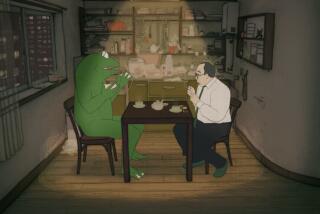Quiet despair
TRY to conjure Appalachia, as figured phonically by Aaron Copland. Now imagine Appalachia -- the actual place -- and the reality glossed over by Copland’s score (think “Deliverance”). Now put it in Japan.
Written within a couple of years of each other, the semiautobiographical novellas “The Temple of the Wild Geese” and “Bamboo Dolls of Echizen” are among Tsutomu Mizukami’s best-known works. “The Temple of the Wild Geese” tells the story of a young Buddhist monk who, after having been abandoned by his beggar mother, was apprenticed to a small country temple. Dostoyevsky’s bastard Smerdyakov comes to mind in this subtle and decidedly creepy tale of Oedipal comeuppance, in which a tight narrative delivers the punch and agility of the author’s celebrated detective stories.
In “Bamboo Dolls of Echizen,” Mizukami continues his psychosexual exploration of how unresolved conflict and the specter of an absent parent haunt the present. Kisuke is just over 4 feet tall, with an abnormally large head. (Both stories feature young, small-framed hypercephalic men.) Talented and lonely (no woman will marry him), Kisuke makes useful items out of bamboo (the details of his craft are rendered with a force of particularity mirrored in the author’s storytelling), until a prostitute once frequented by his father comes to town. A nuanced portrait of inner struggle emerges, memorable both for the aptness of Mizukami’s metaphor -- the mute, perfect doll -- and the lives of quiet desperation limned.
It’s good to wander through the shadows of Mizukami’s imagination, with its singular jangle of spiritual strength and sexual fatalism. Dark and brooding, yet with ease of expression, these novellas are the work of a writer at the top of his range but respectful of old standbys like pace, plot and payoff. Mizukami finds the truth like a dowser finding a corpse while looking for water. Filled with proto-mythic types -- Freudian psychology in an alien culture -- these stories radiate the power of a writer who, like his doll maker Kisuke, exercises admirable control over his medium.
Fiction in translation can sometimes be a painful slog. Not in this case. Even the best translations put a pane of glass between author and reader, but while some lines here buzz with what seems the white noise of an interloper, most of Dennis Washburn’s translation is imperceptible.
In “The Temple of the Wild Geese” and “Bamboo Dolls of Echizen,” Mizukami delivers the bright notes of a clear spirit, shot through with the darker wit of a person who has failed to escape his past. *

